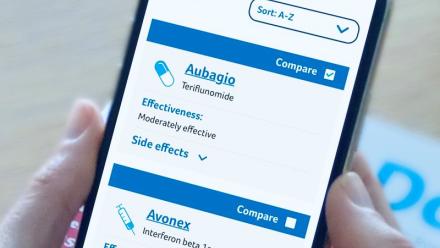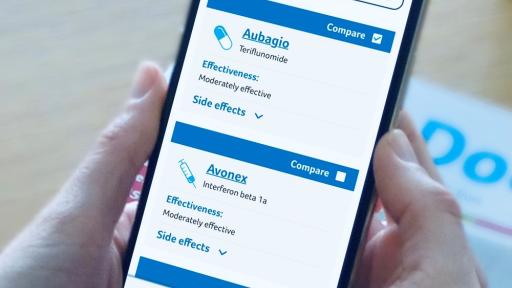Zeposia (ozanimod) is a disease modifying drug (DMD) for relapsing remitting MS.
You take Zeposia as a pill once a day. It reduces the number of relapses by about one half (50%).
Common side effects include head colds, chest infections and urinary tract infections.
What is Zeposia used for in MS?
Zeposia is a disease modifying drug (DMD) for active relapsing remitting MS. You have fewer relapses than you might have had with no treatment and any relapses you do have should be less severe.
Zeposia is a more effective (category 1.2) DMD; in clinical trials, people taking Zeposia had about 38% fewer relapses than people taking Avonex. In clinical trials, MRI scans showed that people taking Zeposia had fewer, smaller or no new areas of active MS (lesions). Zeposia may also slow down the build-up of disability associated with MS.
In Scotland, Zeposia can be prescribed for adults with active relapsing remitting MS.
Zeposia has been approved for NHS use in Scotland since 2021. It can only be prescribed by a neurologist.
NICE reviewed Zeposia for England and Wales; it was not considered to be cost-effective and has not been recommended as an NHS treatment.
Northern Ireland has endorsed the NICE decision and has not recommended Zeposia as an NHS treatment.
It’s important that you tell your MS team if you have any health problems or are taking other medicines. Zeposia may not be appropriate if you have existing medical conditions including: active cancer, a serious infection such as hepatitis or tuberculosis, or severe problems with your heart, liver or immune system.
If you have certain conditions, including heart problems, liver disease or a condition affecting your eyes, you may need additional medical assessment before Zeposia is prescribed and may need additional monitoring during treatment.
You must not become pregnant while taking Zeposia. There is an increased risk of having a baby with birth defects if Zeposia is taken during pregnancy.
Women of childbearing age must use an effective method of contraception during treatment and for at least three months after stopping Zeposia.
Zeposia should not be started by women who are pregnant or planning to become pregnant in the near future.
Women who wish to become pregnant should stop taking the drug but continue to use effective contraception for three months to ensure that blood levels of Zeposia are low enough for it to be safe to become pregnant.
If you do become pregnant while taking Zeposia you should contact your MS team straight away.
You take Zeposia as a pill, once daily.
To give your body time to get used to the drug and reduce the impact of side effects, you start on a low dose for the first few days, gradually increasing to the full dose on day 8.
You should not stop taking Zeposia without discussing your ongoing treatment with your neurologist, as your MS may become more active after stopping Zeposia.
What side effects could I get with Zeposia?
Common side effects include increased risk of infections including coughs, colds and chest infections and increased levels of liver enzymes.
Common side effects (affecting more than 1 person in 100)
- infections including coughs, colds and chest infections
- urinary tract infections
- low levels of white blood cells (lymphopenia)
- slow heart rate
- drop in blood pressure
- increased levels of liver enzymes
Less common side effects (affecting less than 1 person in 100)
- herpes zoster (shingles)
- swelling in the back of the eye (macular oedema)
- posterior reversible encephalopathy syndrome (severe headache, confusion, seizures and loss of vision)
A full list of side effects is included in the manufacturer's Patient Information Leaflet.
Assessment before treatment
Before starting Zeposia, your doctor will check that you are protected against chickenpox. Your heart will be checked with an electrocardiogram (ECG). You should have blood tests to measure blood cell counts and check liver function.
If you have a pre-existing health condition which affects the eye, such as diabetes, you may also have an eye examination.
As Zeposia must not be taken during pregnancy, women of child-bearing age may be offered a pregnancy test.
If you have a history of heart problems, you may be monitored for the 6 hours after taking your first dose.
Zeposia may increase your risk of skin cancer. You should limit your exposure to sun light and ultraviolet (UV) light, by wearing protective clothing and applying sunscreen with high sun protection factor.
Assessment during treatment
Once you’ve started treatment, you’ll have regular blood tests to monitor liver function and measure blood cell counts. Your blood pressure should be regularly checked and if you have a history of eye problems or diabetes, you may be offered further eye tests.
During the coronavirus outbreak, you may find that your regular blood tests happen less frequently, may take place in a different location or may temporarily stop.
Zeposia binds to the surface of white blood cells (lymphocytes) in the blood, and these cells are then trapped in the lymph glands, which prevents the lymphocytes from crossing into the central nervous system and causing inflammation and damage.
Evidence for the effectiveness of Zeposia has come from two large studies.
RADIANCE - Zeposia compared to Avonex (2019)
1320 participants with relapsing MS took one of two doses of Zeposia or Avonex (interferon beta 1a) for two years. For the group taking 1.0mg Zeposia, the relapse rate was 0.17, a 38% reduction compared to Avonex. Compared to Avonex, both doses of Zeposia also significantly reduced the number of new active lesions seen on MRI and reduced brain volume loss.
SUNBEAM - Zeposia compared to Avonex (2019)
SUNBEAM was a one year study, comparing two doses of Zeposia and Avonex (interferon beta 1a) in 1346 people with relapsing remitting MS. The higher dose of Zeposia reduced the relapse rate by 48% compared to Avonex. Compared to Avonex, Zeposia also significantly reduced the number of new active lesions seen on MRI. Changes in brain volume were not significantly different between Zeposia and Avonex.
-
National Institute for Health and Care Excellence (NICE)
Ozanimod for treating relapsing–remitting multiple sclerosis
NICE technology appraisal guidance TA706
Full guideline (link is external)
Comi G, et al.
Safety and efficacy of ozanimod versus interferon beta-1a in relapsing multiple sclerosis (SUNBEAM): a multicentre, randomised, minimum 12-month, phase 3 trial
Lancet Neurology 2019; 18(11):1009-1020.
Abstract (link is external)
Cohen JA, et al.
Safety and efficacy of ozanimod versus interferon beta-1a in relapsing multiple sclerosis (RADIANCE): a multicentre, randomised, 24-month, phase 3 trial.
Lancet Neurology 2019; 18(11):1021-1033.
Abstract (link is external)


